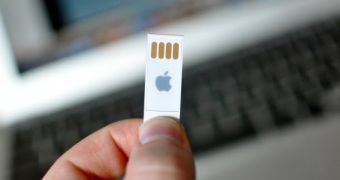This article will allow you to learn the necessary steps for creating your own bootable Mac OS X Leopard (or Lion) image on a USB memory stick. This might be needed if your Mac needs a reinstall or a “Repair Disk” procedure and it has problems reading the bundled Install disc. To use this tutorial an 8 GB or larger USB stick, a second Mac computer with a working SuperDrive or a Mac OS X Install disc DMG file will be needed.
If you ever had problems with your Mac OS X installation you know that the first thing you should do is to check the startup volume using Disk Utility.
After the check has ended and, if the errors exceed a certain level of seriousness, the Disk Utility application will require you to restart your Mac and use its Mac OS X Install disc counterpart.
Other users may have to reinstall OS X altogether, but will find, or already know, that their SuperDrive (a CD/DVD reader and write combo drive) is not functioning properly and it will not be able to read the Install disc.
Although this might happen to Mac OS X Leopard users due to faulty hardware, the vast majority of problematic SuperDrives will be encountered inside Snow Leopard running Macs.
This is due to the updated SuperDrive firmware included in either the Install disc or the software updates one has to install to reach the latest version of OS X, namely 10.6.6. This can be fixed by flashing the SuperDrive’s stock firmware using free command line tools that one can find for free online (I will write about this process also, but at a later time because this article only focuses on allowing you to create your own alternative USB boot disc).
If you are reading this last bit of information with skepticism, than you should know that it happened to me too. Despite all my tries to make it work properly, the SuperDrive kept on munching any inserted DVDs and just popped them out in about twenty seconds.
The workaround to this issue was to create my own Leopard bootable USB memory stick. I am not suggesting a Snow Leopard bootable stick mainly because there are lots of users that have decided to buy the cheaper, Upgrade version, which I have not tested and, therefore, I’m not sure if it will work properly once written to a USB disk.
And now, here are the exact steps you should follow in order to obtain a fully bootable Leopard (or Lion) Install disc.
Step 1 (If you already have the Leopard install disc DMG file you can skip to Step 2)
Launch Disk Utility (you can find it inside /Applications/Utilities). Here select the Leopard Install disc in the list of drives on the left and click on the New Image menu entry at the top of the window. A save message will appear where you will have to select the Desktop as a destination.
Step 2
After Disk Utility has finished creating the Leopard DMG, insert your USB stick and erase all data and reformat the disk. To do this select the USB in the list of drives on the left and, after clicking on the Erase tab on the right side of the window, choose the Mac OS Extended (Journaled) format and click the Erase button beneath.
Step 3
After the USB has been reformatted, download the SuperDuper app from HERE and launch it. Once SuperDuper starts, you will only have to select the DMG in the Copy drop-down menu, your USB memory stick on the right and hit the “Copy Now” button.
One can also use Disk Utility for this task but creating a bootable USB stick failed 2 out 4 times when copying the DMG to the stick (with the exact same settings each time). Creating the bootable stick using SuperDuper proved to be the perfect way to do it because it worked each of the 4 times I tested it.
The steps above can also be used to create a bootable Mac OS X Lion USB by using the InstallESD.dmg image you can find inside the Lion installer (named “Install Mac OS X Lion.app”) downloaded from the Mac App Store in the /Applications folder.
To locate the InstallESD.dmg right click the Lion installer, select the “Show Package Contents” entry, go inside the “Contents” folder, and from there into the “SharedSupport” folder. Inside this folder you can find the InstallESD.dmg you can use to create your own bootable Mac OS X Lion USB stick. To do so, go to the third step described above and use the InstallESD.dmg as the DMG to be copied to your USB disc.
That’s it! Once the process ends you will have a fully bootable Leopard (or Lion) USB disk that you can use as an alternative to the Apple’s DVD Install disc that comes bundled with all Macs.
To use your newly created bootable disk you will have to restart the Mac, press and hold the OPTION key until the Startup Manager appears. Here, select the Mac OS X Install disk using your keyboard arrows and press return to start from the selected drive.
If you have any questions or any problems while following the above steps, leave a comment and I will get back to you with an answer as soon as possible.
[Update 1] Added the minimum USB stick size needed at the beginning of the article and Install Mac OS X Lion.app's location.

 14 DAY TRIAL //
14 DAY TRIAL //